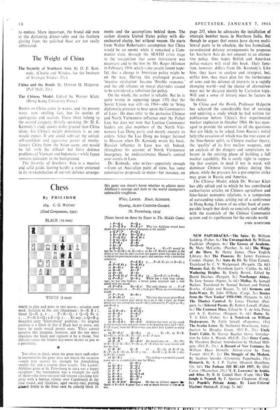The Weight of China
BOOKS on China come in waves, and the present wave, now swelling fast, has its quotas of apologetics and realism. These three belong to the second category. Strictly speaking. Dr. D. E. Kennedy's study covers wider ground than China alone, but China's weight dominates it, as one would expect. If one could subtract the united, self-confident and aggressive power of revolu- tionary China from the Asian scene, one would be left with the difficult but finite defence problems of Vietnam and Indonesia-while Japan remains quiescent in the background.
The Security of Southern Asia is a massive and solid guide, leaving hardly a stone unturned in its re-examination of current defence arrange- ments and the assumptions behind them. The author dissects United States policy with dis- enchanted clarity, but without venom. He starts from Walter Robertson's assumption that China would be an enemy while it remained a Com- munist state, through the SEATO crisis stage to the recognition that some intercourse was necessary and to the hint by Mr. Roger Hilsman in February 1964, which some people found hope- ful, that a change in American policy might be on the way. During this prolonged process, `massive retaliation* became `flexible response,' and the old reliance on moral platitudes ceased to be considered a substitute for policy.
On the whole, the author is reliable. But he is quite wrong in supposing (page 135) that the Soviet Union was still-in 1964-able to 'bring diplomatic pressure to bear upon the Communists of Laos.' He does refer to the pervasive Chinese and North Vietnamese influence over the Pathet Lao, but does not note that Laotian Communist leaders are also members of the North Viet- namese Lao Dong party and merely execute its orders. Since the Lao Dong no longer listened to Moscow when Dr. Kennedy wrote his book, Russian influence in Laos was nil. Indeed, throughout his account of North Vietnamese insurgency, he underestimates Hanoi's control over events in Laos.
page 257, when he advocates the installation of strategic bomber bases in Northern India. But though he argues that events have shown multi- lateral pacts to be obsolete, the less formalised, co-ordinated defence arrangements he proposes for Southern Asia do not amount to an alterna- tive policy. One hopes British and American policy-makers will read this book. Their func- tion, however, differs from Dr. Kennedy's. Like him, they have to analyse and interpret, but, unlike him, they must plan for the furtherance of aims and the defence of interests in a rapidly changing world-and the choice of alternatives must not be dictated merely by Cartesian logic. Will and a sense of history must be factors in the choice.
In China and the Bomb, Professor Halperin has achieved the considerable feat of revising and updating a study which he had written for publication before China's first experimental nuclear explosion in October 1964. He has man- aged to provide the answers to all the questions that are likely to be asked, from Russia's initial help (the cessation of which was the true cause of the Sino-Soviet split), to Chinese nuclear theory, the `quality' of its first nuclear weapons, and an analysis of the dangers and temptations in- herent in the existing phase of building a full nuclear capability. He is surely right in suppos- ing that caution, in deed if not in word, will dominate Chinese foreign policy during this phase, while the pressure for a pre-emptive strike may grow in Russia and America.
The Chinese Mode/, which Dr. Werner Klatt has ably edited and to which he has contributed authoritative articles on Chinese agriculture and Sino-Soviet economic relations, is a symposium of outstanding value, arising out of a conference in Hong Kong. I know of no other book of com- parable length that deals so concisely and reliably with the essentials of the Chinese Communist system and its significance for the outside world.
JOHN HARTFORD






























 Previous page
Previous page